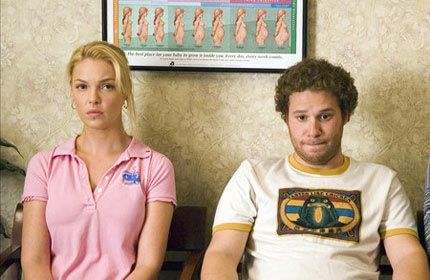
William Gibbons, M.D., president of the American Society of Reproductive Medicine and director for Reproductive Endocrinology and Infertility at Baylor College of Medicine in Houston, gave HealthySELF his most important pieces of advice when it comes to maximizing your fertility.
1. Have sex! Sound obvious? "Yes and no," says Dr. Gibbons. The more sex you're having, the higher your chances of getting pregnant -- but only to a point. "On average, about half of couples trying to get pregnant will do so within six months," says Dr. Gibbons, explaining that if you have sex less than once a week, your odds drop from 50 percent to 18 percent; if you have sex three times a week, your chances increase to about 80 percent. However, if you're having a ton of sex -- say, several times a day -- Dr. Gibbons says that your partner's sperm count could be negatively affected.
In fact, speaking of sperm count, "male-factor infertility is much more common than it used to be," says Dr. Gibbons, adding that about 40 percent of the couples he sees in his practice are there because of an issue with the man's fertility. And, according to the American Society for Reproductive Medicine, one-third of infertility cases are attributed to the male partner (with one-third attributed to the female partner and the other third either caused by a combination of problems in both partners or "unexplained").
2. Don't smoke. "First off, you shouldn't have any cigarettes," says Dr. Gibbons, noting that studies show that if you're smoking 10 or more cigarettes a day, your fertility is definitely diminished -- but even a few a day can have a negative impact, he says (on your general health, too!). "There is evidence that some of the chemicals in cigarette smoke kill the ovary. Women who smoke go through menopause earlier because they're killing their eggs," he says. Also something to consider: Dr. Gibbons notes that, though it's harder to detect in men, there is some evidence that smoking can affect sperm concentration and motility.
3. Maintain a healthy weight. "Women who have a BMI of greater than 27 or less than 17 have diminished fertility," says Dr. Gibbons. "Being in the middle is better -- and that's even true for the male partner!"
4. Moderate your alcohol intake. According to Dr. Gibbons, there's evidence that if you have more than four drinks a week, it can diminish your fertility and increase your risk of ovulatory disfunction. A "drink," he says, is defined as the equivalent of 12 grams of alcohol (so, a 12-oz beer, a 5-oz glass of wine or a mixed drink with 1.5 oz of spirits). There's also evidence that moderate to heavy drinking increases your risk of endometriosis, says Dr. Gibbons.
5. Take it easy on the caffeine. Dr. Gibbons agrees with the March of Dimes recommendation that you consume no more than 200 mg of caffeine per day if you're trying to get pregnant. "That's about three cups of coffee per day," he says.
6. Exercise -- but not to extremes. Exercise and diet are part of a healthy lifestyle, says Dr. Gibbons, but don't overdo it when it comes to working out. "There's a recommendation that women do no more than seven hours of aerobic exercise a week," he says. "More than that begins to be a concern, and has the potential to reduce your fertility."
7. Have safe sex. Protecting yourself from STDs plays a role in your ability to get pregnant. "Venereal diseases clearly have a very adverse affect on your fertility," says Dr. Gibbons. Chlamydia and gonorrhea in particular are "very happy to target your fallopian tubes."
And last, but very certainly not least...
8. Don't delay thinking about all of this. "One of the most important things for women is to understand is that they really need to begin to decide when they're going to build their families [by the time] they're in their early 30s," says Dr. Gibbons. "Many physicians are not talking to their patients about this." If you think you might want kids "someday," it might be time for a heart to heart ... at least with yourself!
No comments:
Post a Comment